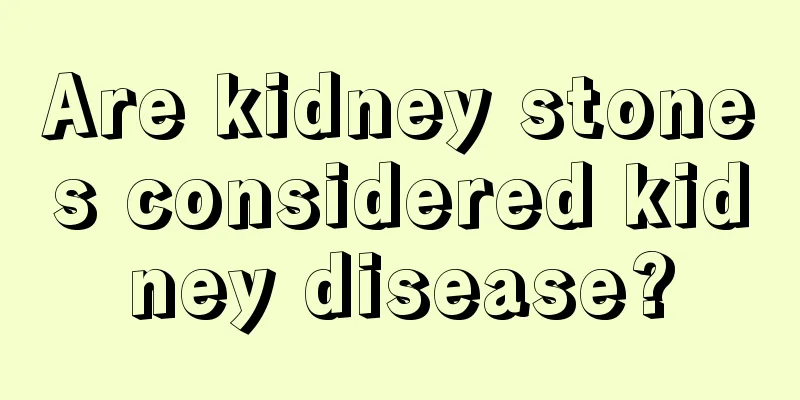Are kidney stones considered kidney disease?

|
The kidneys play an important role in the human body, because they not only excrete excess water from the body, but also absorb useful nutrients from the water in the body. More importantly, the kidneys need to maintain the electrolyte balance in the human body, so when kidney disease occurs, this balance will be disrupted. Kidney stones are a common disease in the human kidneys. But are kidney stones considered kidney disease? Are kidney stones a kidney disease? The answer is no. Kidney stones are not kidney disease but urinary stones. However, if kidney stones are not treated for a long time, they may cause renal insufficiency. Kidney stones are a common urinary system disease. Generally speaking, the disease occurs more frequently in men than in women, mostly in young and middle-aged people, and there is no significant difference in the incidence between the left and right sides. 40% to 75% of patients with kidney stones experience varying degrees of low back pain. The stones are large and have little mobility, which can cause soreness and discomfort in the lower back, or dull or aching pain when physical activity increases. Colic caused by smaller stones often occurs suddenly and is characterized by severe, paroxysmal pain in the waist and abdomen, like a knife cutting. Although kidney stones are not kidney disease, if not treated promptly, the complications caused by kidney stones will still affect kidney function. Back and abdominal pain About half of patients with long-term kidney stones will experience lower back and abdominal pain. In mild cases, symptoms include dull pain, bloating, and dull pain; In severe cases, there are severe paroxysmal intermittent colic, some with knife-like pain, mostly accompanied by radiation to the ipsilateral groin and perineum. A small number of patients also have reflex pain on the healthy side, which is lighter than the affected side. When the pain is severe, the patient often groans incessantly, tosses and turns restlessly, feels nauseous and vomits, becomes pale, sweats profusely, has a low blood pressure, and is in a state of collapse or shock. For a few patients, the pain can be relieved by itself after a few hours, but for most people, antispasmodics and analgesics are needed to relieve the pain. If the stone falls into the bladder, in addition to pain, there will also be stone irritation symptoms such as urgency and frequency of urination. Blockage, local injury When small kidney stones fall into the narrow part of the ureter, they can easily abrade the urinary tract mucosa and cause bleeding and renal colic; they can cause partial or complete blockage, leading to water accumulation in the urinary tract and even renal pelvic dilatation, and cause symptoms such as pain, difficulty urinating, sudden interruption of urination, and urinary retention. Large stones can compress the urinary tract mucosa for a long time, causing epithelial shedding, tissue ulcers, adhesions between the stones and the ureteral wall, and even cancer. Affect kidney function and even uremia Kidney stones are most likely to lodge at the junction of the renal pelvis and ureter, causing urinary tract obstruction. After urinary tract obstruction, the ureter and renal pelvis will expand and accumulate water, affecting kidney function. In severe cases, the entire kidney function may be lost and even lead to uremia. Urinary tract infection Urinary tract infection is often complicated by bacterial infection. Secondary infection of hydronephrosis may lead to pyonephrosis. Severe urinary tract infection may also cause sepsis and threaten human life. In addition, urinary tract infection can cause stones to increase rapidly. Friendly reminder Experts say: Kidney stones are common and frequently occurring diseases of the urinary system and are most likely to occur in summer and autumn. We recommend that the general public should go to a professional and regular stone disease hospital for regular check-ups, especially since some citizens think that they do not need to go for a check-up if they have no symptoms. In fact, most kidney stones are asymptomatic, so it is very necessary to do a good job of inspection. |
<<: Fengyoujing treats diarrhea
>>: Can left kidney stones be cured?
Recommend
Why does bile reflux gastritis make the throat uncomfortable
Bile reflux gastritis is a common phenomenon in g...
What should you eat for gallbladder cancer
Gallbladder cancer has no specific and typical sy...
Can sensorineural hearing loss be cured?
The health of the ears is very important for peop...
Is Monstera poisonous?
Many people like to keep some green plants at hom...
Early symptoms and signs of breast cancer
Early symptoms of breast cancer include breast lu...
How to treat and care for perioral herpes?
Perioral herpes is also known as oral simplex her...
The role of running knee pads
Nowadays, many people like sports very much, beca...
What is the prevention of melanoma
Melanoma is a disease caused by melanin. It has a...
Detailed introduction: Is lung cancer contagious?
Lung cancer is not contagious. There are several ...
What is the most effective way to remove moisture from the body
Everyone has some moisture inside the human body....
How to prevent cervical cancer through diet? Dietary points for cervical cancer patients
Cervical cancer (i.e. cancer of the cervix) can o...
What is the difference between Huadiao wine and Nv'erhong
Everyone is familiar with Nv'erhong. Huadiao ...
What is the reason for vertical lines on the earlobe
Vertical lines on the earlobes are a problem that...
Experts explain surgical treatment methods for prostate cancer
Prostate cancer is a disease that seriously threa...
The efficacy of jade bracelet
Jade is a relatively precious jewelry and many wo...









